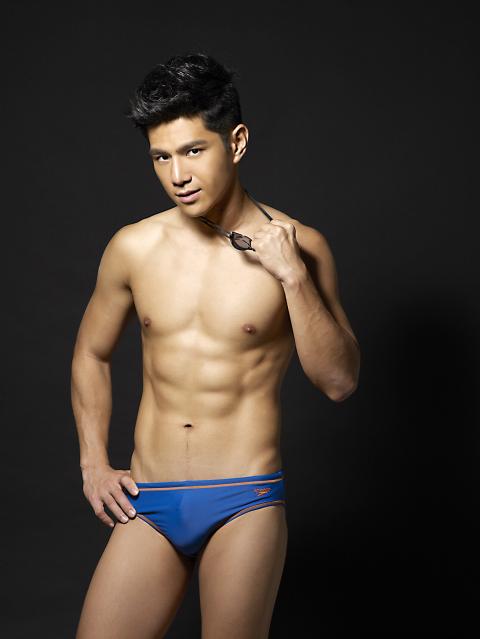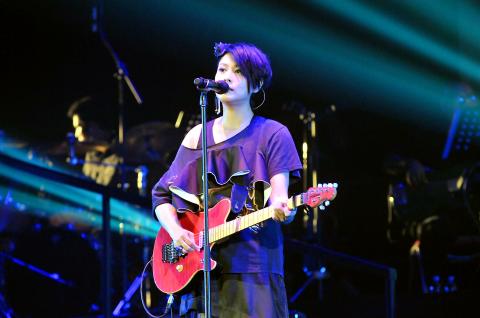What do fitness trainer Hero Tai (戴祖雄), TV host Liang Che (亮哲), actors Yu Gao (高廷宇) and Sky Li (利晴天) and model Paul Hsu (許騰方) have in common? They are all good-looking men with hot bodies, of course. But they are also “dream dates” (夢中情人) for gay men, according to a survey conducted by Kangxi’s Coming (康熙來了), a variety show co-hosted by openly gay Kevin Tsai (蔡康永).
“I am so happy about the outcome,” Tai chirped after taking top honors.
“Keeping in good shape is not easy,” he added after some respondents praised his firm abs. “It is good to know that people admire my body. I feel that all the hard work has paid off.”

Photo courtesy of Kadokawa
Gao, who came third behind Tai and Liang, said that it was a pity he missed the top spot.
“I should work a little harder this year to boost my popularity in the gay market,” the actor said.
DREAM DATE SURVEYS

Photo courtesy of B’in Music
The purpose of the survey was to determine which male celebrities are the most popular within the gay community. The results, which were released in front of the contestants during an episode that was aired in December last year, also help raise awareness about gay issues.
Meanwhile, a report in the Apple Daily (蘋果日報) released a top-10 list of "tiancai" (天菜) — "heavenly dishes" or ideal types — for gay men in November last year. The list included some big names in show business, including actors Takeshi Kaneshiro (金城武), Joseph Chang (張孝全), Chris Wang (宥勝), Godfrey Gao (高以翔) and singer Wang Leehom (王力宏).
For lesbians, surveys show that singer Rene Liu (劉若英) is their top fantasy lover because of her neat appearance and elegant demeanor — though her popularity has taken a hit since getting married and giving birth.
Other lesbian dream dates include Hong Kong singer Denise Ho (何韻詩), pop diva A-mei (張惠妹), singer Hebe Tien (田馥甄), entertainer Rainie Yang (楊丞琳) and even Democratic Progressive Party (DPP) chairwoman Tsai Ing-wen (蔡英文), who earned praise for her professional image and work ethic.
Such surveys, and the discussions they provoke, reflect changing attitudes toward lesbians, gays, bisexuals and transgenders (LGBTs).
Homosexuality, once a taboo subject, hit the mainstream when director Ang Lee (李安) made it a prominent theme in his 1993 movie The Wedding Banquet (囍宴). Lee has since made two other movies, Brokeback Mountain and Taking Woodstock, that also tackle gay themes.
In 1996, the Tongzhi Space Action Network (同志空間行動陣線) organized the Gay Rainbow Lovers’ Week (同志彩虹情人週) in Taipei, which included a carnival and a poll for “top 10 dream dates,” effectively boosting the visibility of the LGBT community and pushing the government, media and public to acknowledge their existence.
“It was probably the first time that Taiwan’s LGBTs managed to achieve the goal of ‘out in culture’ [or cultural acceptance] on a large scale, as gay culture successfully borrowed the polling practice from mainstream culture,” said Eric Luo (羅敬堯), a researcher at National Chiao Tung University.
As society has become more open and tolerant, the media are more willing to tackle gay issues. Tsai, the charismatic and witty writer-turned-TV host who came out publicly in 2001, has helped to create a positive image for homosexuals.
In recent years, LGBT roles have appeared on screen, mostly portrayed in a positive way. Celebrities are generally happy to be named dream dates because the public impression is that gays and lesbians have good taste.
CAREER BOOST
This situation benefits everyone. As the LGBT community receives greater support from celebrities, many of whom are influential opinion makers, celebrities benefit from broad media exposure and increased popularity in the growing gay market.
Take Tai for example. The Malaysian fitness coach’s career has soared since he was named the top dream date last year. Greater media exposure has ensured that his just-published picture book keeps selling out. Currently in its sixth printing, it is a must-have object in the gay community.
Tai also recently signed a NT$1 million contract with a cosmetics company to endorse its skincare products. It’s difficult to imagine that he could have achieved this level of popularity in Malaysia, where Human Rights Watch reports discrimination against the LGBT community is pervasive.
Since becoming a gay icon, Tai says that he wants to do more to promote gay rights.
When asked if he supported same-sex marriage, Tai said: “A persons’ sexual orientation should not bar them from forming a family.”
Taiwan’s LGBT community has made considerable strides over the past few decades, and it is encouraging to see that for most people, homosexuality is no longer a taboo subject. Today, celebrities openly court the LGBT community, and it is common for them to show public support for gay rights, despite the opposition of some homophobic Christian celebrities and entertainers. Hopefully, society will be able to face the existence of homosexuals rationally and take a healthy attitude toward their sexual desire.

Cheng Ching-hsiang (鄭青祥) turned a small triangle of concrete jammed between two old shops into a cool little bar called 9dimension. In front of the shop, a steampunk-like structure was welded by himself to serve as a booth where he prepares cocktails. “Yancheng used to be just old people,” he says, “but now young people are coming and creating the New Yancheng.” Around the corner, Yu Hsiu-jao (饒毓琇), opened Tiny Cafe. True to its name, it is the size of a cupboard and serves cold-brewed coffee. “Small shops are so special and have personality,” she says, “people come to Yancheng to find such treasures.” She

In July of 1995, a group of local DJs began posting an event flyer around Taipei. It was cheaply photocopied and nearly all in English, with a hand-drawn map on the back and, on the front, a big red hand print alongside one prominent line of text, “Finally… THE PARTY.” The map led to a remote floodplain in Taipei County (now New Taipei City) just across the Tamsui River from Taipei. The organizers got permission from no one. They just drove up in a blue Taiwanese pickup truck, set up a generator, two speakers, two turntables and a mixer. They

Former Chinese Nationalist Party (KMT) chairwoman Hung Hsiu-chu’s (洪秀柱) attendance at the Chinese Communist Party’s (CPP) “Chinese People’s War of Resistance Against Japanese Aggression and the World Anti-Fascist War” parade in Beijing is infuriating, embarrassing and insulting to nearly everyone in Taiwan, and Taiwan’s friends and allies. She is also ripping off bandages and pouring salt into old wounds. In the process she managed to tie both the KMT and the Democratic Progressive Party (DPP) into uncomfortable knots. The KMT continues to honor their heroic fighters, who defended China against the invading Japanese Empire, which inflicted unimaginable horrors on the

Hannah Liao (廖宸萱) recalls the harassment she experienced on dating apps, an experience that left her frightened and disgusted. “I’ve tried some voice-based dating apps,” the 30-year-old says. “Right away, some guys would say things like, ‘Wanna talk dirty?’ or ‘Wanna suck my d**k?’” she says. Liao’s story is not unique. Ministry of Health and Welfare statistics show a more than 50 percent rise in sexual assault cases related to online encounters over the past five years. In 2023 alone, women comprised 7,698 of the 9,413 reported victims. Faced with a dating landscape that can feel more predatory than promising, many in